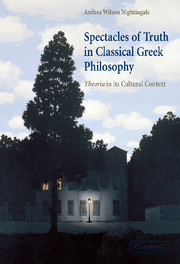Book contents
- Frontmatter
- Contents
- Acknowledgments
- Introduction
- 1 Theoria as a cultural practice
- 2 Inventing philosophic theoria
- 3 The fable of philosophy in Plato's Republic
- 4 Theorizing the beautiful body: from Plato to Philip of Opus
- 5 “Useless” knowledge: Aristotle's rethinking of theoria
- Epilogue: “Broken knowledge”? Theoria and wonder
- List of references
- Index of passages cited
- General index
2 - Inventing philosophic theoria
Published online by Cambridge University Press: 22 September 2009
- Frontmatter
- Contents
- Acknowledgments
- Introduction
- 1 Theoria as a cultural practice
- 2 Inventing philosophic theoria
- 3 The fable of philosophy in Plato's Republic
- 4 Theorizing the beautiful body: from Plato to Philip of Opus
- 5 “Useless” knowledge: Aristotle's rethinking of theoria
- Epilogue: “Broken knowledge”? Theoria and wonder
- List of references
- Index of passages cited
- General index
Summary
What distinguishes the higher human beings from the lower is that the former see and hear immeasurably more, and see and hear thoughtfully … The higher human being always becomes at the same time happier and unhappier. But he can never shake off a delusion: he fancies that he is a spectator and listener who has been placed before the great visual and acoustic spectacle that is life; he calls his own nature contemplative and overlooks that he himself is really the poet who keeps creating this life.
Nietzsche, The Gay ScienceThe most sublime speculation of the contemplative philosopher can scarce compensate the neglect of the smallest active duty.
Adam Smith, Theory of Moral SentimentsIn the fourth century bce, Greek thinkers first articulated the idea that supreme wisdom takes the form of theoria. These philosophers defined their new conception of knowledge in different ways, using different modes of discourse. In addition to offering philosophic analyses and discussions of theoria, the fourth-century philosophers employed powerful rhetoric in the attempt to define this new intellectual practice. None offered a completely neutral or analytic account of theoretical activity; all developed what G. E. R. Lloyd calls “a discourse, or one might say a rhetoric, of legitimation.” In this chapter, I will examine one of the central strategies deployed in the attempt to conceptualize and legitimize philosophic theoria, namely, the frequent use of the discourse and structures of traditional theoria.
- Type
- Chapter
- Information
- Spectacles of Truth in Classical Greek PhilosophyTheoria in its Cultural Context, pp. 72 - 93Publisher: Cambridge University PressPrint publication year: 2004



